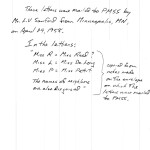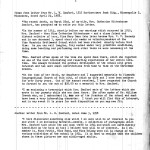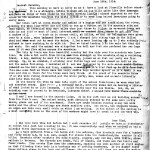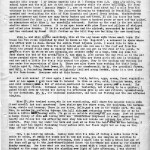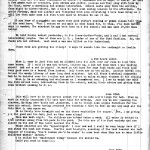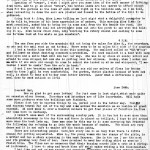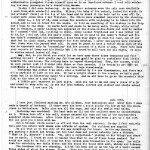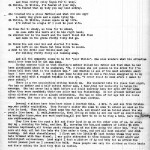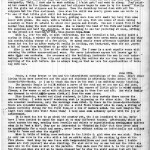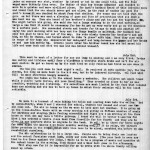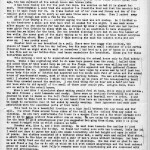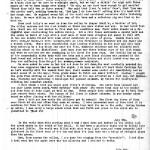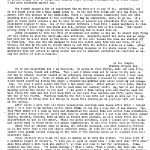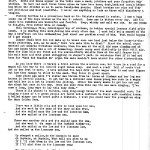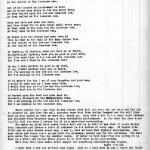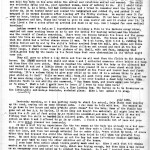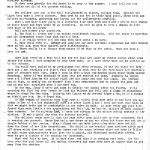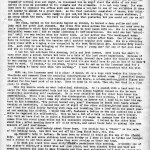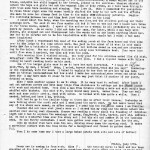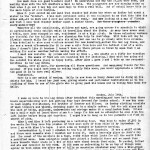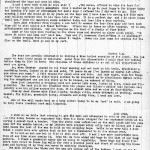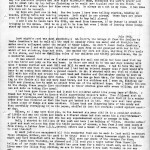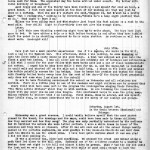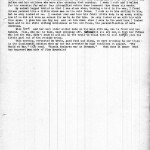Pine Mountain Settlement School
Series 09: BIOGRAPHY – Staff
Catherine Rittenhouse Collection
Correspondence
June-July 1914
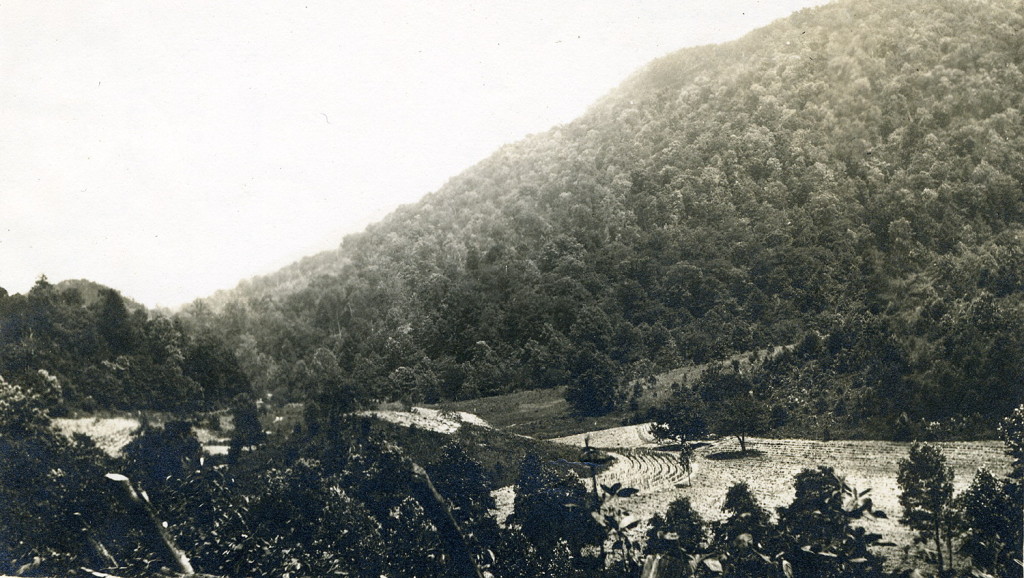
Rittenhouse Collection – “The garden in the bottom.” [D2_06_rittenhouse_catherine032_mod]
CATHERINE RITTENHOUSE COLLECTION Correspondence
June 19, 1914 – August 1, 1914
TAGS: Catherine Rittenhouse, correspondence, Pine Mountain Settlement School, Harlan County KY, teachers, summer workers, Uncle William Creech, Aunt Sal Creech, Dora Read Goodale, Marguerite Butler, Chester, Monroe, Wilson, Fourth of July, Becky May
The letters from Catherine Rittenhouse cover a very short period in her life, just two months at Pine Mountain Settlement School.
From June 19 until August 1, 1914, Catherine and her friend Mary Dana worked as summer volunteers at the fledgling settlement. Along with the founders, Katherine Pettit and Ethel De Long, and a part-time nurse who promptly went on vacation, Catherine and her friend felt their way through the earliest activities of the School and the community. It was a sensory, life-shifting experience neither would forget.
The letters record the initial shock that all staff encountered: the lack of sanitation, poor well water, the rampant diseases, particularly diarrhea, the insects, snakes, mad dogs, and the oppressive heat of summer, but the challenges were deeper than just those physical discomforts. The distance Catherine feels from the culture of the people is palpable.
Hot and steamy summers and the many inconveniences of living so far from any supply center could discourage even the most seasoned dwellers at the School. But the fear, disgust, and daily struggles soon gave way to their rewarding engagements with the people of the community and is vividly recorded in these letters home.
**********
Note: As was common among workers at Pine Mountain, individuals at the school and community members were either referred to by a simple letter, i.e. “Miss R” (possibly Dora Hill Read Goodale), “Miss L” (Ethel De Long), “Miss D,” “Miss N,” “D” (possibly Mary Dana), etc. Or, names were disguised, as was the case with those of community folk.
Typewritten transcriptions of the letters and photographs were sent to the School in 1958 by Mr. Leroy W. Sanford, Catherine’s husband. They were accompanied by a letter from Mr. Sanford, describing his wife and her years at the School. On the envelope that was used to mail the Rittenhouse collection, Sanford added a brief guide to the abbreviations used in the correspondence.
TRANSCRIPTION: CATHERINE RITTENHOUSE Correspondence, June 19 & 22, 1914
June 19th 1914
Dearest Parents,
This morning we were up early so as to have a look at Pineville before starting the journey. It is a straggly, little village set in the hills quite like Ober Amergau and made me think of that place in the early morning light. I almost expected to see the cross on the mountain top when the mists lifted or to meet long haired Bavarians going to early mass.
Our train left at seven thirty and ambled it’s engine and one coach along the river, leaving the main line every now and then to run up a ravine, set in the mountain side and back again. We traveled many more miles than just those to Dillon. An ex-mountaineer sat with us and told us much of local interest until we reached Ages, where he got off at. Then a nephew of J … took us in charge until, at Dillon, we and our belongings were given over to a slim, wiry lad named Henry …, D [Mary Dana] and I changed into riding togs in the Dillon shed and went out to meet the mules. H. led a meek looking one up to D who suddenly refused to have anything to do with it. Then we tried leading D to the mule but that did not work. She said the animal was altogether too tall and that she preferred her own legs even if it was five miles across the mountain.
The trip by train was thru beautiful country but the ride over the mountain was lovelier. We rode a bit north from Dillon then straight up the mountain along a vanishing trail. A boy, wanting to work for his schooling, joined us so that our party was five strong. Up, up we crawled, D climbing over fallen logs and rocks almost as tall as she was and the mules following. I marveled at D and was fascinated by the mule which would flatten itself on the hill side and then, somehow, someway get its hind feet up to its fore feet. This was some feat as there were two heavy saddle bags beside myself on its back. It was cool and dim up there for the trees were very thick. At the crest of the mountain, those of us who were riding dismounted and the whole party, men, women, and animals literally slid into this valley.
It was nearly two when we came into sight of the school farm-house, we were very hot and somewhat weary. Miss P, a strongly built, motherly woman met us, bearing a pitcher of what looked like lemonade. I could fairly hear the ice tinkle. But, oh, on drinking some it proved to be brackish, lukewarm water! I should have known there could be no ice here!
D and I are housed in the Masonic Lodge. It is the loft over an old building across from the farm house. The raised seats, most obviously widened to fit some more portly Mason, grace one end of the apartment. There are crude benches running along two side walls and the other furnishings are three sanitary cots, one stove, two dry goods boxes, an organ and this very small table on which I am writing, In the middle of the ceiling is a most unsightly hole as tho some of the members might have to crawl in and out that way.
June 22, 1914
I may have been this hot before but I can’t remember! Luckily we have no thermometer so cannot till just how sizzling it is. It was comparatively cool when we arrived so had a splendid first impression of the place.
As I have gathered from a few talks with the native, Pine Mountain runs for a hundred and fifty miles N.E. by S.W. and, except for river like the Cumberland, the country is all hills. Mountain after mountain set down higgity, piggity, any old way, with little close valley in between. The forests are dense, full of snakes, and there are few trails and fewer roads. Tiny creeks flow down the crevasses, emptying one into another at right angles so that following their beds it was a tortuous way of getting anywhere. In the Summer noons these valleys steam in the heat and stillness, tho up on the hill tops one sees the motion of wind among the trees. In Winter the creeks are swollen with snow-water and makes any traveling dangerous or impossible.
The school land lies along Laurel Creek [Isaac’s Run] which runs mainly north and south and empties into Greasy (or Greasy empties into it) flowing then S.W. Miss L’s cabin, the school house and the mill are on the school property while the other buildings, the farm-house and store house (Masonic Temple), are on rented land about half a mile from the entrance to the school grounds. The property belonging to the school is beautiful, wooded creek and overlooking the side of Pine Mountain and Laurel Creek bottom. Rhododendrons grow everywhere and there are many berry bushes and nut trees. An old log hose has been reconditioned for Miss L [Ethel de Long], it has been standing there a hundred years or more and has quite an atmosphere which Miss L has carefully enhanced. Farther up the road is the new school shelter [Pole House] where I hold classes. It is an open house with pine floor and pillars of stripped and oiled pine trunks. It is the coolest place and the airiest, surrounded by trees but not too enclosed by them! Still farther up the hill they are building the new dormitory [Big Log].
Miss L and Miss D, the secretary, live at the Log House [Old Log House] with three small boys. The house has two rooms separated by what is known as the “dog-trot,” a screened in space where the office work is done. across the entire front is a wide porch. I would like to take a picture of the place but from the hill behind all one can see is the roof and from the front the ground falls away so steeply that all one can get is the rail of the porch. To get from there to where we are sleeping, one crosses Greasy on a huge, hewn log some ten feet above the bed of the creek. Miss P and Miss R live across the way from us in the old house perched above the turn in the road. With them are three girls who are in training and are paid a little for their help around the place. They do the cooking and washing and are under the supervision of Miss R. There are also three boys working for their keep and Will, a fascinating and religiously inclined young Hermes, sleep in a tent close by the farm-house. Everyone eats at this house.
And such meals! If ever again I meet any fruit, butter, eggs, cream, fresh vegetables meat or ice again I won’t know how to behave! We live on pale, cold, liverish beans, rice, and cold oatmeal, with a bit of chicken smothered in heavy flour gravey [sic] for a treat. The bacon has gone rancid. cornmeal saves the day. Yesterday, not wishing to be a quitter, I poked things down my throat but during the afternoon gave up all and retired, ignominiously to our dormitory. Mr. W, the handsome southerner had been out fishing and the sun affected him, too.
Miss Y, the trained nurse, who is now vacationing, will share the Masonic Temple with D and myself. And such quarters! Down stairs are the storeroom, the tool room, the harness room, stable and hennery. There is one horse, Belle, and a cow in the stable part. the cow tho, is seldom in, preferring to range the hill side and returning every other day or so to leave a little badly needed milk. We go up an outside stairway to our room. Just at present, a large family of rats is living with us. Grandfather Graybeard is a well mannered and hearty old fellow but his offspring won’t obey him and invade our privacy too often for comfort. They play tag under the beds and peek at us thru the hole in the ceiling when we are bathing. D sits up half the nights following their antics with her flash light but as long as they stay off our beds I can sleep.
Yes, I am teaching school. Coming down with the idea of riding a noble horse from cabin to cabin, showing the women how to sew and cook, you can imagine my surprise to have Miss P suggest, that first afternoon, that I might like to take a broom and one of the boys and go up to the just-then-finished House-in-the-Woods and clean up for classes Monday morning. One does what one can here, so armed with a brand new broom, John and I trudged up the rough path thru the slanting light of late afternoon. I was charged with the place and we cleaned out the aromatic shaving and arranged some benches for the Sunday school next day.
The corn isn’t “hoed” yet so the school won’t be very large [population] until that is done. There were twelve to start with, in seven different grades. Ages range from 5 to 15. Trachoma and goiter are too common here and it wrings one’s heart to see these children’s eyes and necks. They are the most reasonable of children, teachable and so eager to learn!
**********
notes001 Handwritten note copied from notations on the envelope of Catherine’s transcriptions mailed to PMSS by Mr. L.W. Sanford from Minneapolis, MN, on April 29, 1958.
“In the letters:
Miss R = Miss Read
“Miss L = Miss De Long
Miss P = Miss Pettit
The names of neighbors are also disguised.”
notes002 April 24, 1958. To PMSS from Mr. L.W. Sanford, Northwestern Bank Building, Minneapolis, MN, describing the approximately six weeks that his wife, Mrs. Catherine Rittenhouse Sanford, spent in the summer of 1914. He has asked Plymouth Congregational Church to send $25 to PMSS out of the amount received by the church for Catherine, “as a memorial to Mrs. Sanford.” He enclosed edited transcripts made by Mrs. Sanford of the letters she sent her parents while at PMSS.
June 3, 1958. To PMSS from Mr. Sanford, enclosing a collection of photographs taken by Mrs. Sanford at PMSS in 1914.
**********
CATHERINE RITTENHOUSE COLLECTION: Summaries, June 22 – August 1, 1914
003 June 22, 1914 (continued). Children’s games, school schedule, sewing classes, Phroney, Maud, Alafair, crocheting, odd gifts to the School, House-in-the-Woods, Sunday school, feuds, rats, barrels of gifts in the loft, Miss L [Ethel de Long], planning classes, furniture for the open air school, teaching, bath night for the children, tripods, tubs, Charlie
June 23, 1914. “Our work here (at the [Masonic] temple) consists of superintending the labors of small boys.” Children’s tasks, John
004 June 23, 1914 (continued). Children’s tasks, soft manner of talking, bottom lands, harvesting corn, John’s appreciation of nature, Miss P [Katherine Pettit], mules for Miss H, the secretary, mail, the children, fleas, garden, butter
June 24, 1914. “Dearest Dad”, the post (mail), parcel post, expense of freight and express travel, incline, daytime heat, surveyors, snakes, dense woods. “Miss R [Dora Read], the young woman in charge of the girls, is a writer and has a story appearing in the next Harper’s….” flies, John, rat poison, four ducks for supper for 19 people, mountain, trees
005 June 24, 1914 (continued). Rhododendrons, boys returning from the fields, barbering, “Wilson, the baby of the school, boils, “Dewey l., a boy of 15” counseled by his father, asks for teaspoons and serving spoons, need for a fireless cooker, heat,, new tent on the mountain, “A little girl wandered in last night….she has been bathed, curried and clothed and starts school this morning. I now have 14 [children].”
June 26, 1914. Mr. M’s clothes, use of safety pins instead of buttons. “And only the swells wear belts.” Head, Wilson, Monroe. “The children are angels!” Visit to the site of the new dormitory, copperhead, treating a snakebite, tent, ballads, Phrony, Charles singing “Pretty Polly”
006 June 26, 1914 (continued). Words to the ballad “Pretty Polly,” Charlie’s parents, new student who wandered in (Lilly), visitors, including Mrs. F and son and Phrony’s sister, the Turner family hoeing corn all day, Stella, a neighbor, Miss P, who “has been in this work for many years and the greater part of the time at Hindman….”
007 June 26, 1914 (continued). Miss P (Pettit) is
“…a wonderful woman with a seemingly inexhaustible supply of energy and patience. I love to hear her tell of her experiences. … She is really the head of the farm and looks after the supplies and half the children. It was touching to see her yesterday at noon, sitting on the ground and reading Uncle Remus to six blue-jeaned boys.
Miss R (Dora Read) …is most interesting. She has traveled a bit, having spent a spring in Italy, a winter in Brittany and so on. She came here seven weeks ago and may stay six months, taking charge of a few girls.
Miss L (Ethel de Long) and Miss N live at the other house. The former is a most capable woman with charming tho rather unconventional ways. She never introduces anyone but leaves one to make their own contacts. She oversees all the building, instructs the men in such undertakings as building a lime kiln and making cement, tho neither she nor they have ever done anything of the sort before. She is always busy, so that we have few opportunities of talking with her.”
June 28, 1914. Sunday school in the House-in-the-Woods, Catherine teaches 6 days a week,, Masonic Temple, Pine Mountain, the “joy of achievement,” neighbors’ interest in “fotched-on folk,” Aunt Mary Gay, Aunt Sarah Anne, Miss R tends a sick child
008 June 28, 1914 (continued). Feud story.
July 2, 1914. Received box of food from home, organ taken to the school house, on which D played “Love Devine, All Love Excelling” for the fascinated children
July 3, 1914. Weather, House-in-the-Woods, band hired for Fourth of July, tent, Masons, Pineville band, Circuit Rider, Temple, plans for Fourth of July celebration with community
009 July 4, 1914. Security of property, preparing the Masonic Hall for the Pineville band, sleeping in the tent, Chester, breakfast, decorating the school house, community gathering, Victrola, Balboa the mill foreman, ball field, description of the tent and its location, mosquito nettings, visiting Aunt Polly to get a sheep, Uncle Daniel
010 July 4, 1914 (continued). Aunt Polly’s stories, visit with Jasper Shall (Sol’s brother), description of Mr. and Mrs. Shall’s cabin, razorback pigs, Aunt Mary Anne, summer complaint, castor oil, Aunt Polly’s knitted stockings
July 5, 1914. Bathing in the creek with Miss R, “preachin’ ”
July 6, 1914. Staying in the tent, cooking over a camp fire
011 July 6, 1914 (continued). “High Knoll,” Marybelle, Johny (sic) H., Weaver brothers, unmorality, Masonic Temple, Chester, John, Charlie, Dewey, Will, Belle the horse, Wilson, Becky May. Miss L asked Catherine to stay the winter.
012 July 8, 1914, Weather, food, picking blackberries, snakes, Bill Corning, Jasper Shall, school organ, “Onwards Christian Soldiers,” lime kiln, mule, road across the mountain, Miss P’s sister, ballads, ballad singers, “The Mary Golden Tree” lyrics
013 July 8, 1914 (continued). “The Mary Golden Tree” lyrics (continued), Will, Jane House, well water, typhoid vaccination, spring water, the Stones
014 July 8, 1914 (continued). The Barkers, tending to a dying baby, Mrs. Stone, Mr. Small, Aunt Polly, cemetery
July 10, 1914. Evie Stone, sewing a grave dress, funeral
015 July 10, 1914 (continued). Mrs. Stone’s grief, flea bites, children pulling flax, straw hats and sunbonnets, food, water, rats, snakes, baseball, kites, farm house, game of checkers, John, Johny H., Becky May, buttons, clothing
016 July 13, 1914. Food, heat, flax, Aunt Judy, Uncle Jonathan’s store, students Sally and Bret Bowers, the lonesome seat, Monroe, Catherine teaching kindergarten class, Charlie, Will, Ag Turner’s baby, Billy Stone’s clothing
017 July 17, 1914. House-in-the-Woods, teaching children to march, Bret, farm house eating porch, lodge, Beck Lou, Lilly, Wilson, Mary, using God’s name in trivial exclamations, basket-making, Will, Chester, Monroe. “Into my window view have come two men, driving sheep down the curving road. It makes a marvelous picture with the blue hills for a background and framed in golden dust.”
July 18, 1914. Miss Y the trained nurse, Aunt Judy
018 July 18, 1914 (continued). “The speech here is such a queer mixture of attractive expressions and bad grammar.” Baseballs, Chester, agricultural train exhibit, Jack’s Gap, New Log House (dormitory), while Miss L is on vacation and a lecture tour, D and Catherine will be responsible for her Log Cabin. Donation of spoons, Mally, Henry James
July 19, 1914. Superintending four boys at Log Cabin, new boy Christopher (Chester and Wilson’s brother), Sunday clothing. “Miss L and Miss N left yesterday on a lecturing tour. They hope to raise $7, 500 in two weeks….” Miss R, D, and Catherine climbed to Jack’s Gap at the top of Pine Mountain: “On both sides row after row of hills or mountains stretched away like a blue, green sea.… Then there was the blessed wind which we have not felt for weeks.”
019 July 19, 1914 (continued). Ferns, flowers, blackberry patch, Aunt Heppy (“wife of the man who donated the school land”), Uncle Jonathan sorting the mail, cow bell, Wilson, Dewey, Sunday evening festivities, fire on the knoll
July 20, 1914. Blue-tailed scorpion, “Aside from the discomforts I could wish for nothing better than to live on here! The response of these children is so out of all proportion to what one gives.” Chester, Wilson
July 22, 1914. Belle (horse), mail pouch, bed bugs, germicide spray, mill whistle
020 July 22, 1914 (continued). Chester, prayers, Wilson, caring for the boys, bath night. “D and I are to leave here the 30th…if Mr Turner is prompt in bringing in the mules. Will be so glad to be home but when I think of leaving there youngsters my heart aches and I get a lump in my throat.”
July 24, 1914. Mr. Bowers brings the mail from the incline for two miles to Uncle Jonathan’s, usually on a mule. Aunt Heppy, corn cob pipe, thirty grandchildren, Belle (horse), Will and Bill, Chester and Christopher, Monroe, Wilson (a six-year-old who “is a peculiar mixture of little old man and clown and wears a tattered straw hat that makes him a real ‘straw man.’ ”) Items received by mail, including food and oranges. Catherine and D leave on Thursday, and, en route, will eat at Will Condit’s, whose mother lives near the Dillon flag station.
021 Alafair, Aunt Heppy, Wilson and Christopher. “The boys have just gone to bed. We have either a tale or a talk before turning in and, after they have tumbled aloft, the quiet is in startling contrast to their noisy chatter.”
July 17 (sic, 27), 1914. Mr. Baker’s accident, boric acid, kindergarten singing “The Three Little Kittens,” decorating the House-in-the-Woods. “Wilson refuses to believe that I am leaving. First Miss L, whom he adored, and now myself. Poor little chap, he cannot understand why he is at the mercy of our comings and goings.”
August 1, 1914. On the train between Cincinnati and Chicago. The children’s presentation of a play, visit to the school mine: Behind a locked door set in the hill, it was “just a cave, but with a wall of good coal; enough to last the school five hundred years, Uncle Jonathan says. This was included in his gift of land, so that his thirty (grandchildren) and their children might have ‘larnin’.”
022 August 1, 1914 (continued). Leaving Pine Mountain, saying goodbye to Wilson, riding on mules to the station with Elsa Roark and her sister. In the Cincinnati station, Catherine saw the newspaper headlines, “The World at War…Russia declares war on Germany.” In the last paragraph of her letter, she wrote, “What does it mean? What has happened yon side of Pine Mountain?”
GALLERY
Filename for images 001-022:
D2_06_rittenhouse_catherine0xx_mod.jpg
- notes001 Rittenhouse correspondence – Description. [D2_06_ritt_notes001]
- notes002 Rittenhouse Collection. Two letters to PMSS from L.W. Sanford, 1958, about donation of the collection. [D2_06_ritt_notes002]
- 001 Rittenhouse correspondence – Page 1
- 002 Rittenhouse correspondence – Page 2
- 003 Rittenhouse correspondence – Page 3
- 004 Rittenhouse correspondence – Page 4
- 005 Rittenhouse correspondence – Page 5
- 006 Rittenhouse correspondence – Page 6
- 007 Rittenhouse correspondence – Page 7
- 008 Rittenhouse correspondence – Page 8
- 009 Rittenhouse correspondence – Page 9
- 010 Rittenhouse correspondence – Page 10
- 011 Rittenhouse correspondence – Page 11
- 012 Rittenhouse correspondence – Page 12
- 013 Rittenhouse correspondence – Page 13
- 014 Rittenhouse correspondence – Page 14
- 015 Rittenhouse correspondence – Page 15
- 016 Rittenhouse correspondence – Page 16
- 017 Rittenhouse correspondence – Page 17
- 018 Rittenhouse correspondence – Page 18
- 019 Rittenhouse correspondence – Page 19
- 020 Rittenhouse correspondence – Page 20
- 021 Rittenhouse correspondence – Page 21
- 022 Rittenhouse correspondence – Page 22
See Also:
CATHERINE RITTENHOUSE Staff – Biography
CATHERINE RITTENHOUSE COLLECTION Photographs

